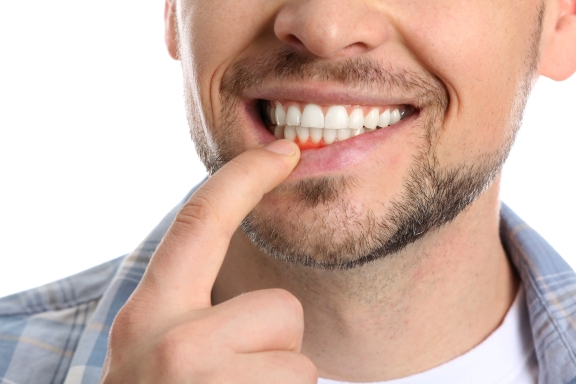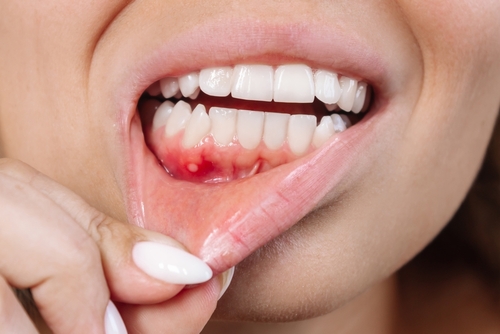Fight Gum Disease at Garden Oaks Family & Cosmetic Dentistry
Our experienced team of dental professionals in Denton is dedicated to helping patients achieve healthy gums and maintain optimal dental health. The best way to do that is through educating our patients on common dental ailments and their prevention. Gum disease is a common condition that can lead to serious oral health problems if left untreated.
From non-surgical treatments to periodontal surgery, our Denton, TX, dentists, Drs. Patrick Ruehle and Erika Eide, customize our approach to each patient’s unique needs and goals. We’re committed to providing exceptional care and helping patients achieve a healthy, confident smile, no matter what oral problems they may be facing.
If you’re suffering from gum disease, don’t hesitate to contact our dental team. To schedule an appointment, call our office at (940) 566-4888.
What Is Gum Disease?
Gum disease, or periodontal disease, affects the gums and surrounding tissues of the teeth. It’s caused by bacterial buildup and plaque on the teeth, which can lead to inflammation, swelling, and infection. If left untreated, gum disease can cause damage to the teeth and gums, leading to tooth loss and other health complications.
Periodontal disease progression is influenced by various factors, including:
- Poor oral hygiene
- Smoking
- Genetic predisposition
- Hormonal changes
- Certain medications
- Systemic diseases like diabetes
Regular dental checkups and professional cleanings are crucial to detecting and treating gum disease in its early stages.
Stages of Gum Disease
Gum disease is typically divided into three stages:
- Gingivitis
- Periodontitis
- Advanced Periodontitis
Each stage of periodontal disease requires different levels of treatment. It’s important to address the condition as early as possible to prevent further damage.
Gingivitis
Gingivitis is the earliest stage of gum disease and is characterized by inflammation and swelling of the gums. Symptoms of gingivitis include redness, bleeding, and tenderness of the gums. Our Denton dentists can treat gingivitis through dental cleanings and by encouraging patients to maintain good oral hygiene habits at home.
Periodontitis
Periodontitis is the second stage of periodontal disease and occurs when inflammation and infection spread from the gums to the surrounding tissues and bone. Symptoms of periodontitis include receding gums, deep pockets between the teeth and gums, and bone loss. Treatment for periodontitis may include scaling and root planing, antibiotics, and surgery.
Advanced Periodontitis
Advanced periodontitis is the most severe stage of gum disease and occurs when the infection has spread deep into the tissues and bones. Symptoms of advanced periodontitis include severe bone loss, tooth loss, and gum recession. Treatment for advanced periodontitis may include gum grafting, bone grafting, and tooth extraction.
Symptoms of Periodontal Disease
While it’s possible to have periodontal disease and not be aware, there are certain symptoms you may experience:
- Bleeding gums
- Red, tender, swollen gums
- Gums that have pulled away from your teeth, also known as gum recession
- Persistent bad breath or a bad taste in the mouth
- Pus between your teeth and gums
- Separating or loose teeth
- Any change in the way your teeth fit together when you bite
- Any change in the fit of partial dentures
Contact our Denton dentists for an appointment if you’re experiencing any symptoms of gum disease. By catching the disease early on, you’ll avoid the development of permanent complications, such as tooth loss.
Periodontal Disease Treatment Options
There are various periodontal disease treatment options available. Those may include:
- Professional Dental Cleanings: Professional dental cleanings are a simple and effective way to remove plaque buildup and bacteria from the teeth and gums. During professional teeth cleanings, a dental hygienist will use specialized tools to remove buildup from the teeth and gums, leaving them clean and healthy.
- Scaling and Root Planing: Scaling and root planing is a deep cleaning procedure that removes plaque and bacteria from below the gum line. This procedure is typically used to treat periodontitis and can help prevent further damage to the teeth and gums.
- Laser Periodontal Therapy: Laser periodontal therapy is a minimally invasive treatment option for periodontal disease that utilizes laser technology to remove infected tissue and promote healing. This treatment can be an effective alternative to traditional gum surgery with less pain, swelling, and downtime.
- Bone and Gum Grafting: Bone and gum grafting restores lost bone and gum tissue due to advanced gum disease or tooth loss. During the procedure, grafts of bone or tissue are taken from other areas of the mouth or a donor source and transplanted to the affected area to promote new tissue growth.
- Antibiotics: Antibiotics can help kill the bacteria that cause gum disease and reduce inflammation and infection.
- Surgery: In some cases, surgery may be necessary to treat advanced gum disease. Surgery options may include gum grafting, bone grafting, or tooth extraction.
Call our Denton dental practice today to learn more about treatment options and how you can prevent gum disease.
Costs of Gum Disease Treatment
When it comes to treating gum disease, costs can range from $1,700 to $8,000, depending on the stage of the disease. The more severe the gum disease, the more expensive treatment is likely to become.
Frequently Asked Questions
Yes, gum disease can be prevented by practicing good oral hygiene habits, such as brushing and flossing daily, using fluoride toothpaste, and visiting your dentist regularly for professional cleanings and checkups.
Symptoms of periodontal disease include redness, swelling, bleeding gums, and tenderness of the soft tissue. If you‘re experiencing any of these symptoms, see your dentist for an evaluation.
No, gum disease is not contagious. However, bacteria that cause gum disease can be spread through saliva, so it’s important to practice good oral hygiene habits to prevent the spread of bacteria and gum infections.
Yes, gum disease has been linked to other health problems, including heart disease, stroke, and diabetes. Maintaining good oral hygiene and treating gum disease promptly can help reduce the risk of these other health conditions and complications.
Let Us Help You Fight Gum Disease in Denton, TX
If you’re experiencing symptoms or warning signs of gum disease or have concerns about your dental health, don’t hesitate to schedule an appointment with our Denton dentists. Our team of dental professionals is here to provide you with the care and support you need to maintain healthy teeth and gums.
To schedule an appointment, contact us today. We look forward to helping you achieve a healthy, beautiful smile! We’re proud to serve patients in Denton and surrounding areas, including Corinth, Argyle, and Krum, TX.





